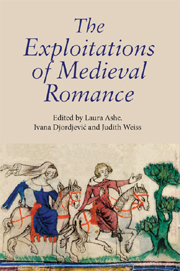Book contents
- Frontmatter
- Contents
- Preface
- Notes on Contributors
- Abbreviations and Editorial Note
- Introduction
- 1 The Fairies in the Fountain: Promiscuous Liaisons
- 2 Saracens and Other Saxons: Using, Misusing, and Confusing Names in Gui de Warewic and Guy of Warwick
- 3 The Exploitation of Ideas of Pilgrimage and Sainthood in Gui de Warewic
- 4 Chanson de geste as Romance in England
- 5 Patterns of Availability and Demand in Middle English Translations de romanz
- 6 Reading a Christian–Saracen Debate in Fifteenth-Century Middle English Charlemagne Romance: The Case of Turpines Story
- 7 Subtle Crafts: Magic and Exploitation in Medieval English Romance
- 8 Meeting Grounds: Gardens in Middle English Romance
- 9 ‘Als for the worthynes of þe romance’: Exploitation of Genre in the Buik of Kyng Alexander the Conquerour
- 10 Sir Gawain and the Green Knight and the Limits of Chivalry
- Index of Manuscripts
- General Index
3 - The Exploitation of Ideas of Pilgrimage and Sainthood in Gui de Warewic
Published online by Cambridge University Press: 12 September 2012
- Frontmatter
- Contents
- Preface
- Notes on Contributors
- Abbreviations and Editorial Note
- Introduction
- 1 The Fairies in the Fountain: Promiscuous Liaisons
- 2 Saracens and Other Saxons: Using, Misusing, and Confusing Names in Gui de Warewic and Guy of Warwick
- 3 The Exploitation of Ideas of Pilgrimage and Sainthood in Gui de Warewic
- 4 Chanson de geste as Romance in England
- 5 Patterns of Availability and Demand in Middle English Translations de romanz
- 6 Reading a Christian–Saracen Debate in Fifteenth-Century Middle English Charlemagne Romance: The Case of Turpines Story
- 7 Subtle Crafts: Magic and Exploitation in Medieval English Romance
- 8 Meeting Grounds: Gardens in Middle English Romance
- 9 ‘Als for the worthynes of þe romance’: Exploitation of Genre in the Buik of Kyng Alexander the Conquerour
- 10 Sir Gawain and the Green Knight and the Limits of Chivalry
- Index of Manuscripts
- General Index
Summary
Anglo-Norman romance started to exploit hagiography and the concept of penitential pilgrimage at the beginning of the thirteenth century. The poet of Gui de Warewic was a veritable magpie, who picked up, as Dominica Legge has remarked, narrative motifs from everywhere. In particular, when he introduced for the first time to insular romance a hero in the prime of life, fame behind him and a happy marriage before him, who decides to give it all up for a poor, anonymous and nomadic existence, he drew liberally both on figures of martial sanctity in continental fiction and on saints' lives, in both Latin and Anglo-Norman. His knowledge of the latter may have come from the possible context for his writing; this is an idea I want to explore later, in greater detail. But his interest in the penitence and lay sanctity of his hero is superficial and easily discarded: it is there to heighten Gui's moral standing and to lend the romance some dramatic gestures, but it disregards textual cohesion and is easily displaced by the subsequent adventures of Gui's son Rainbrun.
Gui's abrupt decision to abandon his family and his lands for a worthier life should be seen against a historical as well as a literary background. Between the second half of the eleventh century and the thirteenth, there was a change in attitude towards the lay state. The early Church had disparaged it, and regarded sanctity as the preserve of monks, but later on noble figures who seemed to exemplify the ideal of the miles Christi helped rehabilitate activity in the world and encouraged the rise of saintliness among the laity.
- Type
- Chapter
- Information
- The Exploitations of Medieval Romance , pp. 43 - 56Publisher: Boydell & BrewerPrint publication year: 2010



